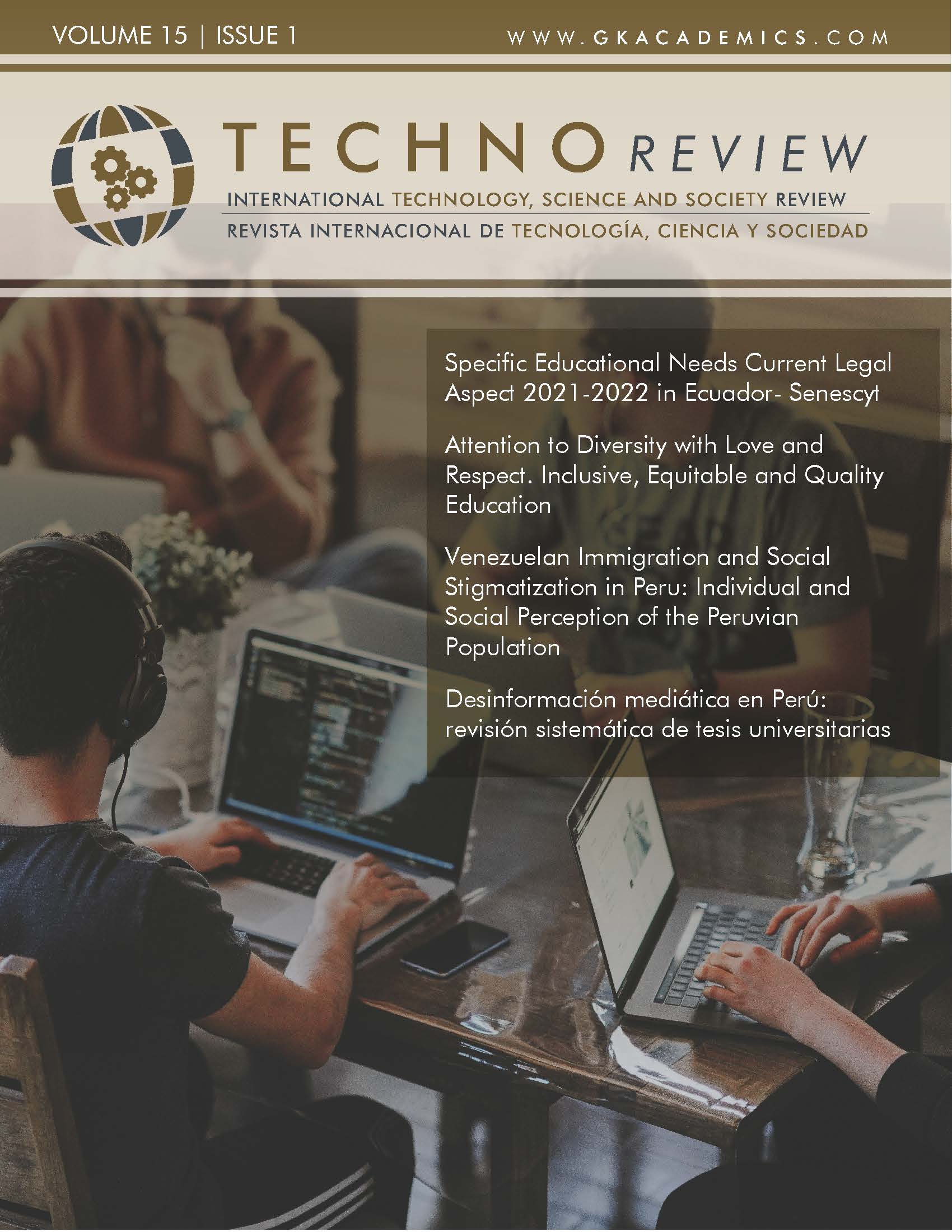Specific Educational Needs Current Legal Aspect 2021-2022 in Ecuador- Senescyt
DOI:
https://doi.org/10.37467/revtechno.v15.5029Palabras clave:
Inclusion, Special educational needs-SEN, Higher education, Effectiveness, Legal frameworkResumen
In Ecuador, education has been considered a fundamental human right and the State has the responsibility to guarantee its universal and equitable access. In addition, the Organic Law of Intercultural Education (LOEI) establishes the legal framework for education in the country. In this sense, governments have a responsibility to provide inclusive and equitable education for all, regardless of their individual differences. In Ecuador, the SENESCYT (Secretary of Higher Education, Science, Technology and Innovation).
Citas
Benitez, R. (2021, July 4). The new narrative in the digital age. Origin, evolution and contributions to the new media. [Video]. GKA VISUAL 2021 - 7th International Conference on Visual Culture. https://events.gkacademics.com/videos/85
Emmett, Y. (2013). Living theory of leadership development for e-learning. [Doctoral thesis] Dublin City University. DCU Online Research Access Services. http://doras.dcu.ie/17723/
Finley, R. (2014, March 29). Prospects still slim for major pick-up of global economy. The Irish Examiner, p. 27.
Galison, P. & Hevly, B. (Eds.). (1992). Big science: the growth of large-scale research. Stanford University Press.
Kuhn, T. (1957). The copernican revolution: planetary astronomy in the development of western thought. Harvard University Press.
Kuhn, T. (1962). The structure of scientific revolutions. University of Chicago Press.
Lupton, D. (2015, December 10). Public understanding of personal digital data. This Sociological Life. https://bit.ly/3urZlLR
Mumford, L. (1934). Technics and civilization. Harcourt, Brace & Company, Inc.
Nolan, C. (Director). (2014). Interstellar. [Film]. Paramount Pictures.
Ovide, S. (2020, November 18). Government surveillance by data. The New York Times. https://www.nytimes.com/2020/11/18/technology/government-surveillance-by-data.html
Pinch, T. & Bijker, W. (1984). The social construction of facts and artefacts: or how the sociology of science and the sociology of technology might benefit each other. Social Studies of Science, 14(3), 399-441. https://doi.org/10.1177/030631284014003004
Shapin, S. & Schaffer, S. (1985). Leviathan and the air-pump: Hobbes, Boyle, and the experimental life. Princeton University Press.
Verschraegen, G., Vandermoere, F., Braeckmans, L. & Segaert, B. (2017). Imagined futures in science, technology and society. Routledge.
Von Hippel, E. (2006). Democratizing innovation. The MIT Press. https://doi.org/10.7551/mitpress/2333.001.0001
Descargas
Publicado
Cómo citar
Número
Sección
Licencia
Aquellos autores/as que publiquen en esta revista, aceptan los términos siguientes:
- Los autores/as conservarán los derechos morales sobre la obra y cederán a la revista los derechos comerciales.
- Transcurrido un año desde su publicación, la versión del editor pasará a estar en acceso abierto en la web de la editorial, pero la revista mantendrá el copyright de la obra.
- En el caso de que los autores deseen asignar una licencia abierta Creative Commons (CC), podrán solicitarla escribiendo a publishing@eagora.org







